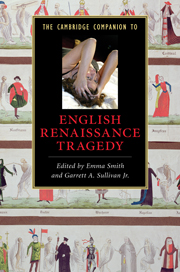Book contents
- Frontmatter
- Part 1 Themes
- Part II Readings
- 11 The Spanish Tragedy and metatheatre
- 12 Doctor Faustus: dramaturgy and disturbance
- 13 Edward II: Marlowe, tragedy and the sublime
- 14 Arden of Faversham: tragic action at a distance
- 15 The Revenger’s Tragedy: Original Sin and the allures of vengeance
- 16 The Tragedy of Mariam: political legitimacy and maternal authority
- 17 The Changeling and the dynamics of ugliness
- 18 The Duchess of Malfi: tragedy and gender
- 19 ’Tis Pity She’s a Whore: the play of intertextuality
- Index
13 - Edward II: Marlowe, tragedy and the sublime
from Part II - Readings
Published online by Cambridge University Press: 28 November 2010
- Frontmatter
- Part 1 Themes
- Part II Readings
- 11 The Spanish Tragedy and metatheatre
- 12 Doctor Faustus: dramaturgy and disturbance
- 13 Edward II: Marlowe, tragedy and the sublime
- 14 Arden of Faversham: tragic action at a distance
- 15 The Revenger’s Tragedy: Original Sin and the allures of vengeance
- 16 The Tragedy of Mariam: political legitimacy and maternal authority
- 17 The Changeling and the dynamics of ugliness
- 18 The Duchess of Malfi: tragedy and gender
- 19 ’Tis Pity She’s a Whore: the play of intertextuality
- Index
Summary
The spirit of the sublime. . . subjugates terror by means of art.
Nietzsche, The Birth of TragedyThis chapter reads Edward II by attempting to highlight its historic significance: in a drama about the national politics of individual sexuality, Marlowe pens the West's premier literary genre, tragedy, in the register of the 'preeminent modern aesthetic category', the sublime. By presenting 'tragedy' as sublime, Marlowe renders a shocking version of his most daring paradox: in this theatre, suffering is exalted; humiliation, powerful; the murder of an anointed king by a 'red hot' spit (5.5.30), riveting. The real legacy of Edward II is not strictly the stoic humanism of suffering featured in earlier twentieth-century criticism, or the radical politics of anti-monarchism, passionate desire and gay rights celebrated in recent criticism, but rather the heightened poetics of a new English theatre: Marlowe's tragic theatre of the sublime.
The Oxford English Dictionary defines 'sublime' as 'set or raised aloft, high up' (Def. 1), while the Oxford Classical Dictionary is more specific: derived from the Latin sublimitas (loftiness, exaltation), the word means 'that quality of genius in great literary works which irresistibly delights, inspires, and overwhelms the reader'. In the only recent overview study, The Sublime, Philip Shaw unpacks the paradox of a literary genius that at once inspires and overwhelms: 'Sublimity . . . refers to the moment when the ability to apprehend, to know, and to express a thought or sensation is defeated. Yet through this very defeat, the mind gets a feeling for that which lies beyond thought and language.'
- Type
- Chapter
- Information
- The Cambridge Companion to English Renaissance Tragedy , pp. 174 - 187Publisher: Cambridge University PressPrint publication year: 2010
- 1
- Cited by

